
Something Up Their Sleeve
By Andrew Joseph, Features Editor; Photos by Naomi Hiltz
Automation Converting Food Safety General Cans Film Palletizing a div. of Regal Beloit ABB Group Aesus Packaging Systems Crown Holdings Inc. Identification Multi Solutions Inc. igus Inc. Leeson LLC Marathon Electric Ontario Craft Brewers Regal-Beloit Corporation Resolution Inplant Services Rockwell Automation Sessions Craft Canning Ltd. Siemens Canada Limited Ska Fabricating slideshow Uline Canada CorporationOntario mobile canning company for brewers now offers sleeving and branding capabilities for cans—May 2018, Canadian Packaging
Sessions Craft Canning founder and chief executive officer Jeff Rogowsky (left) and lead shrink sleeve technician Jake Dunn stand aside the company’s new Aesus Packaging Systems model Delta Shrink MB sleeving unit that can sleeve silver bullet cans at a rate of 200 cans per minute at the Mississauga, Ont.-headquartered facility.
Many a person has dreamed about creating their own beer, and thanks to many home starter kits, the dream has become a reality.
For other dreamers, they want to take that newly created beer taste sensation and start up their own brewery in the hopes of becoming the next John Labatt or John Molson or John Sleeman without having to change their name to John.
And then there are the dreamers who simply want to brew beer, maybe make a little money on the side, but are content maintaining their hard fought craft brewer status, something that the 242 operating breweries—and growing—in Ontario alone are doing, according to the association of Ontario Craft Brewers, as of February 2018 data.
Within the Canadian packaging industry, there are a host of ancillary enterprises that work to help the craft brewer in its day-to-day operations, such as those who manufacture and supply the brewhouse, fermenting tanks, fillers, coders, and even delivery trucks—it’s a long line of men and women who work behind the scenes to enable a consumer to go to a refrigerator to crack open a cool one.
And then there’s Sessions Craft Canning Ltd., a Toronto-area company located in Mississauga that helps facilitate some of the more boring aspects of brewing, that allows the brewer to get back to doing what they do best—crafting an atypical, often edgy beer.
“Our company provides a mobile packaging solution that helps new and existing breweries scale their brands without having to invest a significant amount of capital on equipment that they might only be using a few times a month,” Sessions Craft Canning founder and chief executive officer Jeff Rogowsky told Canadian Packaging magazine during a recent visit to its new
33,000-square-foot facility that the company moved into earlier this year.
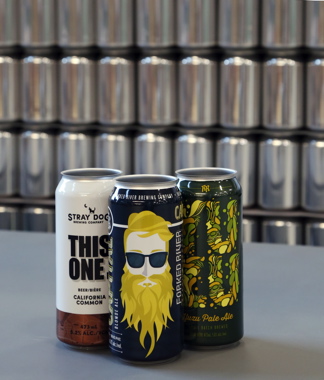
A few examples of the stellar can sleeving work performed by Sessions Craft Canning.
Even before starting up Sessions Craft Canning, Rogowsky had been involved in the industry for five years with a company that manufactured and distributed beer and beverage chilling and dispensing equipment.
Using his contacts within the industry, and realizing he needed to spread his wings, Rogowsky took that leap of faith into not only starting up his own business, but starting up a new business segment in a province that had not yet seen its like before.
“It could have gone bad, quickly,” notes Rogowsky, “but I did have a couple of aces in the hole.”
Incorporated in late 2014, Sessions received its first piece of filling equipment in the early days of January 2015, and with Rogowsky armed with the knowledge it had two customers willing to grow with him, it began its mobile canning operations.
At that time, Sessions Craft Canning occupied just 1,000 square feet of space within an industry friend’s business, but with craft breweries catching on quickly to the advantages of the mobile canning operation, a few years later they moved into an 8,000-square-foot facility, before quickly expanding after another year to the current 33,000-square-foot facility.
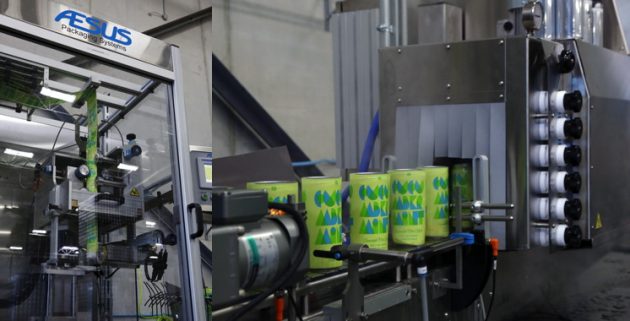
At the Sessions Craft Canning facility in Mississauga, empty silver bullets cans move through an Aesus Packaging Systems model Premier Shrink MB sleeving unit (left), before riding a conveyor system through an Aesus Hybrid 72 inch heat/steam tunnel that gives the operator six different controls apiece near the entrance and exit to manipulate the exact needed pressure to ensure a proper shrink of the sleeve to the can.
While West Coast Canning in B.C. was the first Canadian company to offer the mobile canning service, Rogowsky quickly realized an opportunity existed to bring the same service to the Ontario region.
Now, two short years later, Sessions and West Coast are sister companies—having formerly merged under one parent company, but keeping both operating names—that not only provide mobile canning services, but also offer much more.
“We are now a complete supplier for all things cans,” begins Rogowsky.
“We are a distributor of printed cans—where the label is direct printed onto the aluminum can—and we supply blank or silver bullet cans,” he continues, “but the biggest change is that we now have the space and application equipment to provide the relatively new to the craft beer and cider industry service of shrink sleeve labeling on a can.”
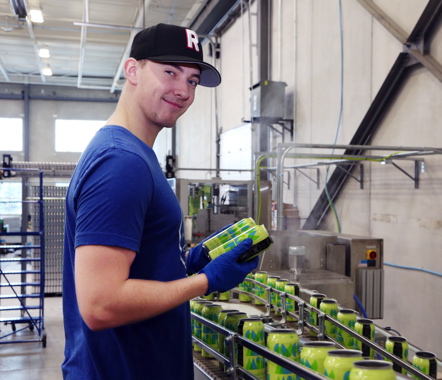
Employees of Sessions Craft Canning are trained in all technical aspects of the company’s daily business, including shrink sleeve operator Julian Pek, taking care to provide a visual check of the just-sleeved cans to ensure the plastic film adheres properly so craft brewery and cidery customers will receive perfect packaging.
Because of its relationship with West Coast Canning, Rogowsky says they now use synergies between the companies when it comes to operations but also the combined purchasing power of both companies helps to reduce the cost of various supplies, which they can then pass along to the breweries it works with from coast-to-coast.
Along with a mobile canning line and a crew of two in the nation’s capital of Ottawa, Sessions Craft Canning has three other mobile canning lines based at the Mississauga facility, all of which are usually out on the road these days.
“When we began, we only one mobile caning line and only two customers that first month, then three the next month, and four or five the next month,” Rogowsky explains. “But nowadays with the four mobile lines, we can sometimes be out canning up to 20 jobs a week, and soon it will be more as we add our fifth mobile line, which we are preparing to add shortly to our Ottawa location which will help us with growth into the neighboring province of Quebec and fulfill some of the demand we are seeing with breweries in Montreal.”
As of April 2018, Sessions Craft Canning had canned just over six million cans for a wide range of Ontario craft breweries, cideries and beverage companies.
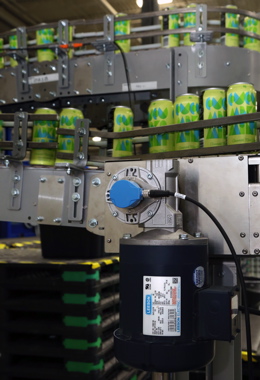
A motor manufactured by Leeson, a division of Regal Beloit, helps provide quick and smooth operation of a conveyor line moving sleeved cans to a repalletizer.
They travel all across the province and are now starting to branch into Quebec.
“While I had driven seven or eight hours to do a job when we first started, nowadays with the addition of our Ottawa location, we generally drive one to four hours away in any direction to get the job done,” Rogowsky acknowledges.
He says that for any one brewery or cidery using its mobile canning services, Sessions Craft Canning is able to package up to 65 hectoliters in an eight-hour shift—which is more than 13,000 16-ounce cans of beer or cider.
A typical day involves arriving at the location, taking about 60 to 90 minutes to unload, set up and get their equipment ready before the canning begins. Once the canning is done, it takes about 60 minutes to pack up and be on the way.
Depending on the size of the job, the company will often work double shifts or stay for two or three days at a time for some of its bigger customers.
“We regularly have canning jobs where we stay for three days at a time and will package upwards of 50,000 cans,” notes Rogowsky.
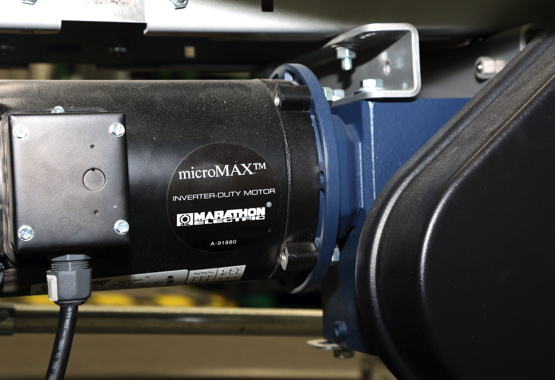
Manufactured by Marathon Electric—a division of Regal Beloit—a microMAX brand inverter-duty motor helps keep things running smoothly at the Sessions Craft Canning headquarters in Mississauga, Ont.
But why cans?
Rogowsky points to the science of aluminum cans chilling faster, offering more space to apply cool craft beer graphics to make it stand out on the shelf, and the fact that the cans are able to block out 100 percent of UV (ultraviolet) light which could affect the taste turning it skunky.
As well, there’s the green aspect.
“Since a beer can weighs significantly less than a beer bottle, there’s a huge difference in shipping costs,” mentions Rogowsky.
Also, because of a reduction in shipping weight, greenhouse gases produced by transporting trucks are reduced.
He also points out that the aluminum cans are 100 percent recyclable—infinitely recyclable, even.
“Our mobile canning lines are very high quality packaging lines,” he relates. “We typically have better canning equipment than what most breweries just starting out are likely to own.”
Equally important, Rogowsky explains, is that Sessions Craft Canning travels with a wide range of quality control instruments that are often cost prohibitive to new companies starting out.
These instruments can check dissolved O2 levels—an important indicator of shelf-life—examine the CO2 levels that dictate the carbonation in the beer, and also provide bacteria swabbing after cleaning to ensure its equipment is free of any unwanted organic or inorganic material prior to packaging for the day.
“Sanitation is extremely important to us and for our customers,” Rogowsky states. “We bring all of our own chemicals into the customer facility, run a full clean-in-place on our equipment before and after a canning job.”
The pre-canning sanitation check ensures that everything is clean, and before canning, they confirm the sanitation data results with the owner and/or brewmaster before the actual packaging begins.
At the conclusion of the filling, Sessions Craft Canning provides a detailed report to the brewery including such information as how many cans were filled, weights of the cans, details about sanitation, and the overall quality checks that were done during the day.
“But it’s all part of the service Sessions Craft Canning offers,” smiles Rogowsky.
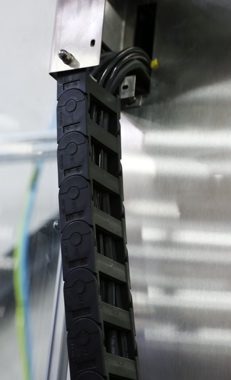
A close-up view of an igus wireguard system within an Aesus Packaging Systems model Premier Shrink MB sleeving unit at Sessions Craft Canning.
Despite the success the company has enjoyed since its launch in 2015, Rogowsky isn’t one to place all of his beer in one case, and has sought to diversify Sessions Craft Canning’s efforts into
other aspects of the third-party filling market segment.
In an effort to increase its presence in the brewery and cidery markets, Sessions Craft Canning is now not only an official distributor of printed and silver bullet cans for Crown, but it now works alongside customers to design and pre-print cans at Crown, providing them with a one-stop canning shop.
And, for those that don’t wish to go the preprinted can route, Sessions Craft Canning offers a special labeling service—shrink sleeving, whereby it will take a preprinted plastic film, and drop it over a silver bullet can before running it through a steamer or heat tunnel to present a brilliant graphic image around the beverage container on behalf of its brewery customers.
“Depending on the arrangement,” explains Rogowsky, “we either ship the sleeved cans to those customers who have their own canning lines, or we take the sleeved cans with us along with our mobile canning line and fill and seal the cans on their premises.”
The allure for craft beer brewers and cideries is the ability to create affordable small print-run labeling.
When a brewery decides it wants to package in cans they previously only had one option which was to buy a full truckload (~160,000 cans) of one brand at a time.
This, says Rogowsky, is how the big can manufacturers sell cans which is often quite prohibitive for a smaller brewery starting out.
Most smaller breweries won’t have the space to store the cans, the cash flow to buy them, or even the demand to sell 160,000 cans of one brand.
The smaller- to medium-sized breweries are all looking for flexibility of selling multiple brands and are also testing out which one of those brands they eventually might want to buy full truckload quantities of, as a full truckload will always be the lowest unit cost/can to a brewery.
“Our shrink sleeve labeling option creates a viable alternative for the true small-run brewer of beers or ciders,” extols Rogowsky, “knowing we can supply them with just the right amount of cans for that five-, 10- or 15,000 can run.
“That being said, we are now getting orders of well over 100,000 shrink sleeve cans as a lot of breweries now just prefer this look.”
While it is true, says Rogowsky, that the downside to the mobile canning service is that when a brewery becomes big enough and is canning more than two to three times a week it might make sense for them to eventually buy their own canning line.

ABB Group’s Dodge brand pulley components help ensure a smooth delivery of empty silver bullet cans to and from the Aesus sleeving unit at Sessions Craft Canning.
But when Sessions Craft Canning loses a mobile canning customer due to growth, it has not lost them for good, as it can retain them by offering different services, such as selling them pre-printed cans or shrink sleeve cans, trays or lids.
“Since a craft brewery or cidery has already developed a successful relationship with us—and knowing we played a part in their economic success—they are apt to continue working with us, if we give them a reason,” he says.
Rogowsky says that for the first two years of operation, Sessions Craft Canning only offered a mobile canning service, but at the beginning of 2017 it acquired a sleever system from their now partner company West Coast Canning that provides labeling at a rate of 50 cans per minute tightening the plastic sleeve to the can via radiant heat.
Thanks to the success of that, it recently installed a brand new Aesus Packaging Systems sleever system earlier this year that can be utilized with either radiant heat or with steam, as some plastic films bond better with steam, while others work better with heat.
Located in Pointe-Claire, Que., Aesus is a well-known and well-respected manufacturer of robust sleeving machines, labelers, fillers, cappers, conveyors and turntables.
The entire new line at Sessions Craft Canning consists of: a Ska Fabricating, LLC depalletizer with Siemens Simatic HMI (human-machine interface) to automatically off-load the silver bullet cans into the system; an Aesus Premier Shrink shrink-ready rotary sleever; an Aesus Hybrid 72 inch heat/steam tunnel to shrink the sleeves tightly to the cans; and a Ska Fabricating repalletizer with a Simatic HMI.
Sessions Craft Canning utilizes plastic Crown Link & Seal Pallets, as well as cans manufactured by Crown—two sizes of 355 milliters and 473 ml.
“One of the main reasons we purchased the Premier Shrink from Aesus is because West Coast Canning has two machines from them, and we knew that if they had nothing but good things to say about theirs, it would be a smooth ride for us,” states Rogowsky.
Sleeving technology, according to Rogowsky, is not as simple as turning the machine on and watching the sleeves fall around a can. His operators maintain that it takes a deft bit of artistry to make each run of cans come out perfectly.
The pre-printed plastic film that is the sleeve contains variances when the operators are sleeving cans for different customers, as well as for different brands belonging to the same customer.
“Shrink sleeve labels for the beer industry are fairly new, only really happening the past three or four years, and there are limitations to the sleeve.
“The colors you can use, the design elements, how much ink is on the label, the spacing of the ink and how they are being applied by either radiant heat, steam or a combo unit can all affect the quality of the end product,” explains Rogowsky. “It’s an art to create a really good shrink sleeve labeled can, and we’re pretty darned good at it.”
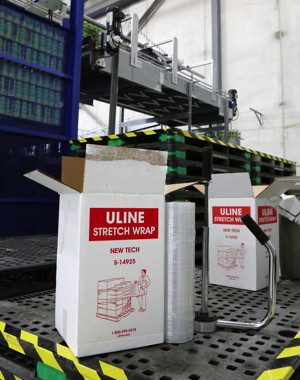
Sessions Craft Canning utilizes ULINE shipping supplies to stretchwrap pallet loads of its sleeved and silver bullet cans to its brewery and cidery customers in Ontario and Quebec.
There are two types of Aesus Premier Shrink sleeving machines: the Premier Shrink LB that uses a linear blade to cut the sleeve after it has been placed over the container or onto the container neck for neck bands; and the Premier Shrink MB as purchased by Sessions Craft Canning, where multiple blades spin around the mandrel to part the sleeve before application to the neck or container, which then quickly plunges the sleeve onto the container or neck of the product.
While the Premier Shrink SB has a top speed of 120 cans per minute, “The Premier Shrink MB has been designed by Aesus to provide an intermediate speed system that can operate as slow as 60 cans per minute up to 250 cans per minute,” says Rogowsky.
“Following the lead of West Coast Canning, we are finding that our optimal speed at this time to be around 200 cans per minute,” he continues.
Providing tremendous accuracy to cut the sleeves, the Premier Shrink systems use servo feed mechanisms and multiple servo knives, according to Aesus.
When the container is underneath the mandrel, the Premier Shrink MB’s servo-controlled feed system spins the sleeve down onto the container.
Because the sleeves are not released until they are on the container, static electricity that could cause the sleeves to crumple as they are applied, is not in play.
“We really like this sleeving system from Aesus,” states Rogowsky. “It’s very easy to set up for new jobs, and we’ve become pretty adept at adjusting the steam controls to ensure a perfect graphic application on the cans.”
Providing the plastic shrink sleeve film is Montreal-based IMS (Identification Multi Solutions), a product identification solutions provider since 1958 that designs and manufactures printed products for a diverse field of industry segments.
The company offers a sweeping range of shrink sleeve printing services, including digital, flexographic and rotogravure to help achieve whatever aesthetic aspects the customer is looking for, while also being flexible enough to print any volume of high-quality label needed—a huge boon for craft breweries who tend to specialize in low-run beer products.
“IMS has been our sleeving partner from the get-go,” says Rogowsky, “and we couldn’t be happier with the product they supply to us for our customers.”
Used with the Aesus line, Rogowsky says they are able to get a nice soft seam that is tight to the top, while providing vibrant colors, all of which play a crucial aspect of a great shrink sleeve can.
“One of things we can offer that other label providers can not, is that all of the employees at Sessions Craft Canning actually care about the craft beer industry,” he relates.
Summing up, Rogowsky is extremely optimistic about Sessions Craft Canning and its future growth within the craft beer and cidery market.
“I really enjoy the sleeving and sales of pre-printed cans that we are able to offer the ever-changing craft brewer,” he says. “And along with the continued growth of our mobile canning operations both here in Toronto and Ottawa areas, the future looks very bright.”
Advertisement

